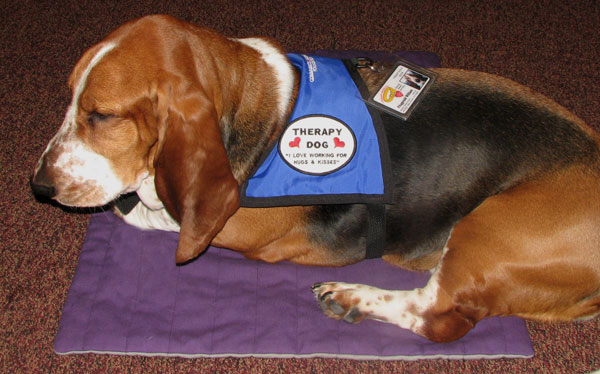Healing hounds

Fitzgerald, a registered therapy dog, visited area hospice facilities with owner Molly Johnson prior to their move to Minnesota. Johnson is now past president and founder of Compassionate Canines.
Joy, fear, sadness. These are just a few of the emotions that dogs seem to be able to sense from their human companions. Their ability to notice what’s right or wrong and bring the perfect reaction makes them a logical fit to help in a variety of settings. Registered therapy animals, in this case dogs, have been making an impact in the Fox Cities with those ranging in age from youth to elderly. Whether it’s patiently sitting by one’s side or curling up for a snooze, the nonjudgemental and calming nature of man’s best friend goes far beyond their visits.
School skills
Jorja Walker, 9, relaxes as she opens “On the Night You Were Born” by Nancy Tillman and prepares to share the story with Lily Belle, a St. Bernard who is content to listen and even take a bit of a snooze as Dr. Carrie Willer, Lily Belle’s owner and Jorja’s principal, looks on.
“It feels fun. She’s really nice to read to. She’s really calm and she falls asleep because she thinks it’s a bedtime story,” says Jorja, a third-grader at Franklin Elementary School in Appleton.
Amy Keener, Jorja’s mom, points out that reading with Lily Belle has helped her daughter’s speech improve.
“It’s great. We’ve been working since she was in kindergarten to get the stutter under control,” she shares.
As the first school in the Appleton Area School District to offer Reading to Canines, Franklin is in its seventh year of continuing the program with the Fox Valley Humane Association.
“We have pretty much the same volunteers that we had seven years ago and I think that really speaks to their dedication to the program,” Willer shares.
The dogs must undergo specialized training to prepare them for their role as a therapy dog and for additional stimulation, like fire drills, that they may encounter in a school setting.
“It’s quite magical when the dogs come into the building,” Willer adds, noting its like a calm comes over the building or classroom. Students make an emotional connection with the dogs and look forward to future visits.
“All of a sudden, you have that cute little canine there and that fear factor is gone,” Willer says. “This somehow never seems to get boring to them for some reason. … The kids are very unihibited, they speak very freely to the animal.”
In addition to assisting with reading, the visits also have helped in revealing trauma that students are dealing with and creating an understanding of animal husbandry, the different types of roles dogs can take on from pet to service to safety, working versus petting and safety discussions.
This year, ELL or English-language learner students, along with second- and fifth-graders will have an opportunity to read with the dogs who come in. Each year, the grade levels are examined. Visits typically last an hour and most are once a week or every other week depending on the volunteer. About three students get the chance to read in that hour.
Students get to pick a read from their book box. There tends to be a lot of selections that involve dogs like, “Henry and Mudge” and “Biscuit,” Willer adds with a chuckle.
A few years into the program, Willer wanted to understand exactly what the training process entails. She went through it with her own St. Bernard, Lily Belle.
“It was a great experience even for my animal and I because we formed a different bond,” she shares.
Once a week, she invites students, typically those who are having a harder time with reading, to her office by sending home a permission slip to read with Lily Belle for 15 minutes. This also helps Willer track their proficiency.
“When the dogs have those vests on, they take on a different demeanor. They’re like, ‘Hey, I’m ready to work,’” she says.
Rescued for a reason
Fox Valley Humane Association’s therapy dog volunteers included 44 teams as of August and 12 more were to be trained in September. The teams visit 30 different locations at this time from elementary schools to libraries to Boys & Girls Clubs to assisted living and hospice facilities.
“A lot of the dogs were from here and adopted. It’s great to see those dogs being rescued and turned into therapy dogs,” shares Amy Prahl, volunteer coordinator. “It teaches anyone, from any age, what a dog can be. They’re not just a dog. They’re a companion.”
Gizzy, an American Eskimo Mix, was the first dog to be adopted and turned into a therapy dog from the FVHA in 2005. He also was the first to retire last year.
Trainer Carol Beck has sought out dogs and matched them with owners to further the program, Prahl adds.
“It just makes the day 10 times better. If you can brighten the day of someone who is at the end of life, it just makes the day that much better,” says Prahl.
For children who may not do well with dogs, but prefer cats, the FVHA also offers Cat Tales.
“The cat is getting socialization as well as the child,” says Prahl. “It’s a great program to have because some kids are afraid of dogs. … If it continues to grow, we will grow with it.” Registration is open now for the first and third Tuesday of each month through December and is generally open to first- through fourth-graders.
Library learning
Tanya Misselt can identify with kids who struggle with reading.
“I think I could read in my head better than I could read out loud,” shares the Children’s Services Supervisor at the Appleton Public Library. “To have kids relax and let go of the stigma of not being an eloquent reader … I can honestly say that is a huge benefit to young readers.”
Misselt is proud to see the Pooches & Pages program continue at the library for another school year. It has been going on for six years after starting with Fox Valley Humane Association and continuing with Compassionate Canines, Inc. for the last four.
“The children love it. They come very early to see which dogs are here. They can’t wait,” adds Ellen Jepson, school-age librarian.
Picking out the book becomes almost secondary, she says and adds that children in the program view the dog as a friend.
“It kind of changes the vibe for the library,” Misselt says. “It makes the whole environment less threatening. … The hope is once they become more comfortable with reading, they’ll do it more.”
The program is geared toward first- through fourth-graders on a first-come, first-served basis. The first session of the school year is currently running and registration for the winter/spring program will be held Jan. 4 at 9 a.m. both online at kids.apl.org/cal and by calling 832-6187. At this time, the program is offered on the first Saturday of each month when school is in session. It is not for entertainment purposes, but rather helping kids to overcome the anxiety that can be associated with reading. Participating children, volunteers and four dogs are in the room during each 15-minute slot; parents are asked to wait outside. Sixteen students have the opportunity to participate each Saturday.
“This way, they can just enjoy being with the dog and reading the way they want to read,” says Jepson.
Kids are welcome to bring their own books, select them from the Children’s Department or pull ones from a cart for the program that has early chapter or beginning readers and other age-appropriate selections with high-interest topics and authors.
“We kind of depend on the parents to determine whether or not this program is right for their child,” Misselt notes. “It’s through the generosity of Compassionate Canines that this program exists.”
Pooches & Pages also is offered at the Neenah Public Library with Compassionate Canines to first- through fifth-graders on the second Saturday of each month, 12 months a year. Registration is open now for all months on a first-come, first-served basis by emailing [email protected] or calling 886-6335.
Spreading compassion
Jodie Frohne, vice president and secretary for Compassionate Canines, became involved with the organization in 2003 with her English Cocker Spaniel, Joe Cocker, after moving to the area from California and seeing an ad in the newspaper. Frohne contacted Molly Johnson, now past president and founder, who in turn interviewed the duo.
“I found that he had a wonderful temperament and was great with people,” says Frohne of Joe Cocker. She became involved in the organization after doing therapy work with Affinity and Fox Valley Humane Society. The group began as a social support group of sorts to share resources and experiences when it came to animal therapy volunteer work.
While Joe, 14, retired in December 2014 after 10 years of volunteering, Frohne continues to volunteer her time with Filmore, an English Springer Spaniel, who started in January after going through training. Together, they visit places like the Franciscan Court in Oshkosh, Neenah and Little Chute libraries, Camp HOPE for Kids, and the University of Wisconsin-Oshkosh as part of the Pet Perk Me Up program during exam times and new student meet and greets.
“It’s just been a tremendous success in Molly’s responsibility really,” Frohne shares.
“I’ve been doing it because I love working with these folks,” says Johnson who recently moved out of the area and decided to step away from the organization for now. “It’s pretty amazing the results we’ve seen over the years.”
“With her keen organizational skills and love of the program, we met as a board and mapped out how the roles of the program could be divided,” Frohne says. “I foresee the group continuing. I think it’s an opportunity to bring in fresh ideas. … I think there’s a lot of interest in keeping the momentum going.” There are roughly 55-60 active volunteers at this time and some have more than one therapy dog.
While there is no cost to the volunteer for training, other than their time, the nonprofit does depend on donations.
Participating therapy dogs have to be trained and registered through Therapy Dogs Inc., a national registry, in order to be a volunteer with Compassionate Canines.
Word of mouth has continued to keep the demand for Compassionate Canines going, but more volunteers who meet the required guidelines are welcome. Due to the reach of current programming from schools to libraries to hospice work, Frohne feels the sectors have already been identified that the organization will likely continue to work in, but the reach could be expanded to outlying areas.
Johnson shares that there is not necessarily a particular breed of dog that is best suited to volunteer, it’s more about “personality, temperament and character.” “We can’t train dogs to love people,” she adds.
People who are interested in learning more, are asked to visit compassionatecanines.org.
Healing paws
Therapy dogs also are making an impact in health care settings with patients and families.
“It’s often times that the patient will respond more to the pet than the person,” says Jane Shea, hospice volunteer coordinator for ThedaCare. “The dog serves as a trigger.”
With dementia patients for example, there is no connection to the present, but there can be to the past so previous interactions with a dog may surface during a visit with a therapy dog and lead to more of “a wow factor” versus an interaction with a hospice employee.
Touch is an important aspect of care, says Teri Metropulos, ThedaCare at Home hospice manager.
“It’s so important for families to touch. When family members are dying, we’re cautious to touch. To have their family members interact with that dog is so important to bring them back to that sense of touch,” she says.
In one particular instance, a therapy dog also served as a conduit to reconnect a woman who had late-stage dementia with her brother, Metropulos shares. The therapy dog was able to calm the patient down enough that staff was able to get a more detailed history from her, found out she had a sibling, tracked him down and she was able to speak to him on the phone before she peacefully passed a few days later.
Within the ThedaCare system, therapy dogs from Compassionate Canines are visiting primarily hospice facility patients at this time and have been doing so for more than six years in the Fox Valley area. Metropulos writes a grant each year to the ThedaCare Hospice Foundation to continue receiving funding for the dogs to come in. She says the interactions take the environments from feeling sterile to lighthearted.
Visits also can reduce incidents of depression, decrease high blood pressure and pain, lessen the need for medication, spark conversation, bring people together and reassure family members that their loved one’s remaining days have quality and meaningful moments.
Pup pick-me-up
Jack and Nancy Zolkowski make regular monthly visits with their dogs to St. Elizabeth Hospital in Appleton and Mercy Medical Center in Oshkosh.
The Zolkowskis follow the rules and purchase their insurance for their purebred Pomeranians — Dr. Pepper (Pepper), Sierra Mist (Misty Mist), Ginger Ale (Ginger) and Barq’s Root Beer (RB) — through Therapy Dogs Inc. Jack and Nancy have owned four other registered therapy dogs who have since passed.
The couple continues to do volunteer work due to its rewarding nature, one-on-one interactions and the joy their dogs have brought to patients and families.
Jack recalled an insistence of a young boy who was involved in a car accident that was affected by one of his visits.
“He started talking with me and the dog. It was almost like a miracle in disguise because he wouldn’t talk to his own family,” Jack shares.
Jack and Nancy also have made it a tradition to visit people on Christmas and say they run into people who recall their visits. While the Zolkowskis don’t go into patient rooms through their volunteer work with Affinity, they have with other health systems.
“It makes them forget about the moment in their mind,” Nancy adds of their interactions. “It’s always rewarding to give someone something better to think about than their pain and uplift their day.”
—FC










Leave a Comment